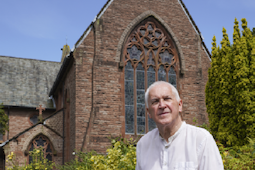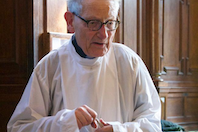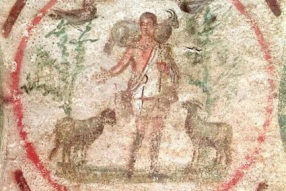Sunday Reflection with Fr Terry Tastard - 7 March 2010

Recently I was watching a film about the life of Jesus with some parishioners. The temptations were done particularly cleverly. The tempter appeared to Jesus with the suggestion 'Turn these stones into bread.' But that was not all the tempter said. He went on to depict all the starving people the world. Imagine, he said to Jesus, imagine what you could do to feed these if you follow my instructions. Jesus replied that what the world needed was not to turn stones into bread, but rather to turn hearts of stone into hearts of generosity. This was his mission. Already there is enough food in the world to feed everyone, but still we have not found a way to make sure that children do not go to bed at night hungry. We have not found it because across the globe our desire to achieve this is not deep enough. We always look after number one first: ourselves.
We should remember this when we hear the words of the gospel with its repeated command to repent (Luke 13.1-9). Repentance sounds a little old-fashioned, perhaps a little too interiorised. A movement in the soul, with little connection to the world outside. But repentance, metanoia, means a thorough change, a fresh orientation, a different outlook, a new way of seeing things. And if by the grace of God we manage this, then the world beyond our nose will not stay the same. Hearts of stone will have been changed to hearts of generosity, and the consequence will be that the hungry are fed and the humble are lifted high.
Even if this happened, it would still be a world of natural disasters. Only recently the terrible earthquakes in Haiti and Chile have reminded us that we live that we live on a surprisingly fragile planet. If hearts of stone were changed, there would still be floods, or droughts, or earthquakes, not to mention the many varieties of human illness. We always wonder why such things happen. Well, let's look again at today's gospel. Jesus reminds his listeners of an incident when the sudden collapse of a tower killed 18 people. This was in Siloam, today's Silwan, a Palestinian suburb of Jerusalem. Everybody in Jerusalem knew about this disaster. Jesus says that those who died were no worse than everybody else in Jerusalem. In other words, the tower did not fall on them as a punishment. Sometimes people of faith try to explain disasters by making them part of the wrath of God. For example, AIDS has been explained as divine punishment by Christian preachers, while some Muslim preachers in Indonesia attributed the terrible tsunami of Boxing Day 2004 to the anger of God. Our gospel today shows us that this was not how Jesus thought. The unexpected is part of life. Our life is never completely within our control. The challenge Jesus puts before us is to live our lives in such a way that we are prepared to meet God. It would give us perspective on our lives that would help us find a right balance.
The right balance between helping ourselves and helping others, between living in trust and seeking security. If we did this, we would create a world where the afflicted were speedily helped.
Fr Terry is Parish Priest at Holy Trinity Catholic Church in Brook Green, west London. His new book: Ronald Knox and English Catholicism is published by Gracewing at £12.99 and is available on Amazon, from religious booksellers and from the publisher.
For more information see: www.holytrinityw6.org





















